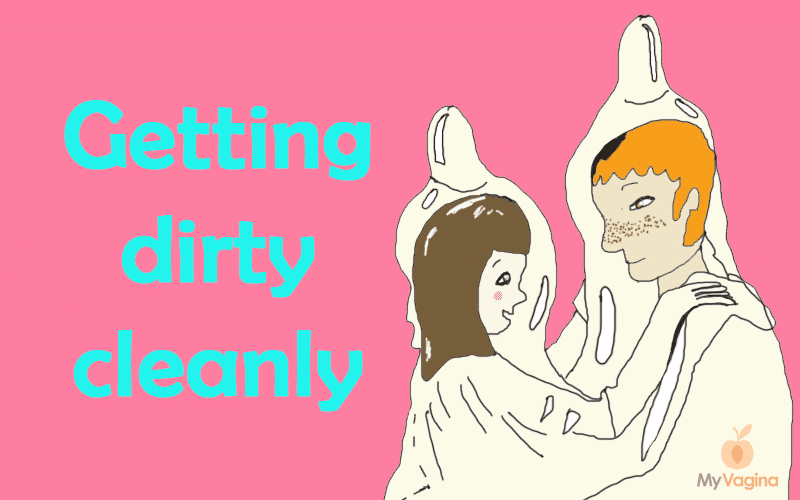Understanding how you have sex is key to keeping disruptive bacteria out of your vagina. This isn’t about condoms – let’s assume know about those.
Anal play
Anything to do with the anal canal and anus can be dangerous to the vagina. This is due to the ease with which faecal bacteria can travel from the anus to the vagina and urinary tract, particularly when you consider vigorous sexual activity, hands, sweat, saliva and other bodily fluids all over the place, and the proximity of the vagina to the anus.
Some of us have short perineums, so the problems can be worse. Anal bacteria are usually the germs responsible for UTIs, but can contribute to vaginal infections like aerobic vaginitis (AV), which looks like bacterial vaginosis (BV), but is typically from aerobic intestinal bacteria, as opposed to anaerobic.
Aerobic vaginitis can be hard to get rid of, especially if you are using BV antibiotics since AV microbes are typically very antibiotic-resistant. If you are having fun with your butts, be diligent in your cleanliness and practices, including possibly considering anal douching, condoms, and immediate showering afterwards.
If you consistently find that no matter how clean you are during anal play you are still getting infections, you may need to call it quits. Your body can’t afford to be on constant antibiotics to treat these (basically preventable) infections.
Sexual hygiene
Sexual hygiene is incredibly important, whether it is using condoms, not double-dipping (anus to vagina) with fingers, toys or penises, or simply peeing after sex to help avoid urinary tract infections.
Practise preventative measures as a matter of course and your bacterial balance, even if precarious at times, will be better supported and you will have some buffer room.
The more bad bacteria your body and healthy microbes have to fight off, the more work required. Be thoughtful about your sexual activity with what goes where.
“Miscellaneous” vaginal stuff
Vaginas are receptacles and have many things put in them over a lifetime for a variety of reasons. What you put in can help or hinder your attempts at infection-proofing your vagina, so do yourself a favour and keep any weird stuff out.
This includes food products, any kind of cream or gel (except approved lube and treatments), soap, and water.
You want to keep your protective bacteria in abundance while reducing any food source for pathogens.
Douching
Besides any prescribed treatments, don’t. There are many products on the market that aim to increase vaginal acidity levels to keep the germs at bay (usually just vinegar at an inflated price) which is ok, but you usually don’t know what the ingredients are and what else they might be doing.
Steer clear and use diluted vinegar if you are going down that route. Vaginal ‘hygiene’ and ‘freshness’ has become big business by trying to convince even those with the most delicious of vaginas that they are dirty, smelly and unworthy of love and intimacy.
Treat the cause of any bad smells (almost always bacteria) and don’t believe a word of it.
Spermicide and contraceptive creams
These not only kill sperm on contact, but can also kill your healthy lactobacilli. If you are prone to vaginal infections, you may need to find another method of birth control because this one is almost certainly either directly causing or significantly contributing to your upset vagina.
Lube
Silicone lubricant does not appear to affect vaginal pH and most water-based types are vaginal pH-matched. Stay away from lubes that contain glycerine (a type of sugar) and any containing fats or oils. Read more on choosing the best lube for the job.
The most comprehensive vaginal microbiome test you can take at home, brought to you by world-leading vaginal microbiome scientists at Juno Bio.
Unique, comprehensive BV, AV and 'mystery bad vag' treatment guide, one-of-a-kind system, with effective, innovative treatments.
Promote and support a protective vaginal microbiome with tailored probiotic species.






